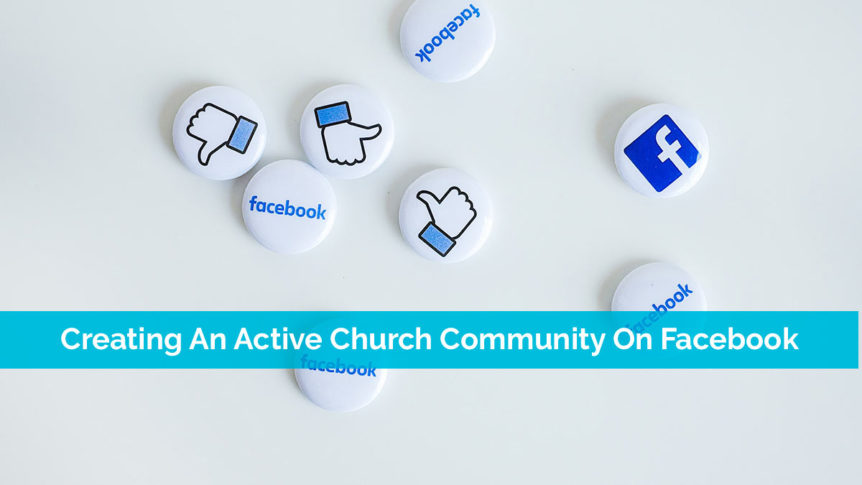Whether you love it or hate it, social media is here to stay, especially Facebook. Why not make the most of it by creating an active church community on Facebook?
The social media giant is still the most popular network to reach people of all ages. This means it’s a great place for every member of your church family to connect online.
Of course, you’re not just limited to your members. Invite other Facebook Christians to join in your conversations to build a thriving online community.

Understand Pages And Groups
Before you get started, it’s important to understand the difference between Facebook pages and groups. Pages work much like a personal profile. However, these pages have extra features and analytics that make them better for businesses and nonprofits.
Anyone can like and follow a page. Of course, your church can block anyone at any time if they can’t behave.
On the other hand, groups are a great addition to having a church Facebook page. Groups can be public or private. Public groups are open to anyone.
Private groups are only for those you invite. People can also request to join your group. Users can search for private groups. However, you can create a hidden group so no one can search for it, either. This type of group is completely invite-only.
All churches should have at least a page. This is the central hub for your church community on Facebook. Groups are best if you want to create additional communities based on certain interests or positions, such as ministry groups, volunteers, new members, etc.
We’ve created a guide to helping you make the most of Facebook groups for your church.
Post A Variety Of Content
If you want an active community, you have to post a variety of content for everyone to engage with. Simply posting church announcements won’t be enough, though you should post these too.
This has always seemed like one of the biggest mysteries on Facebook – what should you post? While everyone wants to go viral, you never really know what exactly might hit. The key is to just post great, engaging content. The good news is there are certain types of posts that have proven to be much more engaging than others.
Buffer did an in-depth study of 777 million Facebook posts. They took the 500 top-performing posts to see what these posts did differently. Those 500 posts alone racked up over a billion engagements, such as likes and shares. What Buffer learned was:
- Video does better than anything else (59% more engagement)
- Videos made up 81.8% of the top 500 posts
- Static images made up 18% of the posts
- Just 0.2% of the posts just had links and/or text
- Love and Haha are the top two reactions (people love funny and inspirational content)
- Inspirational content leads to the most engagement (46.9% of all reactions on the top 500 posts)
A few other things Buffer learned was people want relatable content. Businesses that humanized their brands, such as police departments, saw much more engagement. People want funny, inspirational and practical content.
Overall, the best types of Facebook content includes:
- Videos
- Inspirational
- Funny
- Practical (how-to, guidance, advice, etc.)
- Images
- Blog post links
- Shared content from others
Post Frequently
Ask 20 experts how often to post on Facebook and you’ll get 20 different answers. The only thing they’ll all agree on is you need to post frequently and regularly. To create an active church community on Facebook, you need a regular stream of content to keep people engaged.
According to Sendible, posting consistently is actually more important than frequency. So, instead of posting 15 times on Mondays and waiting until Saturday to post again, post something several times each day. Ideally, try to post around the same times each day so users know when to expect a new post.
Another important thing to remember is to focus on quality over quantity. Much like with a blogging strategy, give your users content they actually want versus just trying to fill space.
If you do this, they’ll not only check out your posts more often, but they’ll share it more often too. The more shares you get, the more overall engagement you’ll get on your church’s Facebook page.

Create An Engagement Policy
This might not sound important, but your church should create an engagement policy. This is especially important if you have multiple admins on your page and within groups.
An engagement policy helps create a more active church community on Facebook by ensuring people are being responded to correctly. For instance, if someone tries to start an argument, your policy might list several ways to diffuse the situation before it becomes problematic.
Your policy should also state when you should respond. If people on your page are having a discussion in the comments, you don’t have to reply to every comment. However, it’s a good idea to jump in now and then to show that you’re doing more than just posting and leaving.
Another important aspect is what is and isn’t acceptable. What types of comments are okay and which ones will you remove. Your church community on Facebook needs to be a safe place for your followers. Outline what actions to take when a follower goes too far and encourage people to report any bad behavior.
Share Content From Others
The great thing about Facebook, and social media in general, is you don’t always have to create everything yourself. There are 55 million new posts every single day. Odds are, other Christian leaders and churches are sharing great content. Share some of their inspirational or funny posts.
Sharing content from others exposes your audience to new perspectives and types of content. Those other pages can also see that you’ve shared their content, which may make them check out yours as well.
With so many posts on Facebook daily, no one can read it all. Sharing with your audience gives them content they might never have seen otherwise. It also turns your church not only into a community, but an authority in the niche, which builds your community faster.
Don’t forget, you can also share content from your members if they let you. Ask them to submit stories, tag your church in their posts and suggest links/videos your church might want to post.
Ask Questions Regularly
Maybe you have a growing number of followers on Facebook. This might seem like an active church community on Facebook, but if no one is interacting with each other, your followers might never engage with your content at all.
It’s not uncommon for people to follow a page or join a group, but then never interact with it. The less they engage with your content, the less often it’ll show up in their newsfeed.
You have to give your followers a reason to interact. The easiest way is to ask questions. It’s direct and encourages people to say something. Once they start talking, others respond too.
A few ways to ask questions include:
- What type of content do they want to see more of?
- What did you think of last week’s sermon (post the video if possible)?
- What’s your favorite Bible verse and why?
- A poll to vote on favorite scripture, stories, etc.
You can also ask more serious questions, such as “did a certain event lead you to God” or “do you attend church regularly or not, if not, then why.”
Not only will you get to know your community better, but they’ll have questions that make them interact with you and others. Try to ask at least one question a week to keep people engaged.

Promote With Facebook Ads
Facebook ads might make you immediately discount Facebook. However, spending just a little each week brings more visibility to your church’s Facebook page.
If you want to build an active church community on Facebook, you need people. With so many other pages and groups competing for attention, the easiest way to build more followers and a larger community is to buy ads. The good news is you don’t have to spend much to get results.
You also don’t have to continue to rely on ads, either. Instead, as you build a following, your online church community grows. As long as you’re sharing great content and encouraging interactions, they’ll stick around. Plus, you’ll have more people sharing your content. This brings in even more people, making ads less necessary.
Encourage Members To Participate
At first, you’re not going to have a big community. This doesn’t mean you can’t have an active community. At the end of every service, encourage your members to follow your church’s Facebook page.
Let them know that it’s not just about announcements. Instead, tell them it’s a community for everyone to interact and continue worshipping all week long. Your younger members and millennials will love the focus on community in an online environment.
While some of your older members might not be as interested, you’ll find that the majority of your members (of all ages) will at least check it out. Your job is to make it interesting and worth their time. An engaging page with fresh, quality content daily is useful and a great addition to their newsfeed.
Use Facebook Live
Remember how video is incredibly popular? Try Facebook Live for a more interactive experience while giving people the video they love.
Create an event and let everyone know when it’ll be. This could be a mini-sermon, interviews with Christian leaders, Q&A sessions or anything else you might want to share with your viewers.
Viewers interact with the video in real-time. Once you’re done, you can leave the video up for others to check out later.
Facebook Live gives your followers a much more personal experience versus just standard posts. While you don’t have to do this all the time, try to do it a few times a month.

Pay Attention To Facebook Analytics
An active community is one that’s reacting (liking and other reactions), sharing and commenting. Thanks to Facebook’s built-in analytics, it’s easy to see what types of posts, and what times, do the best.
If your followers love early morning posts with a funny slant, add a few more of those each week. However, even if certain types of posts do well, keep a variety. Don’t just replace all your posts with one type just because it performs well.
Your audience loves variety. Just use the analytics to give them more of what they love.
Have A Good Sense Of Humor
Overall, an active church community on Facebook needs a lighter aspect. Have a good sense of humor. While it’s great to share something serious, people have a lot of negativity in their lives. If your church can make them laugh, they’ll be more likely to engage with you.
A good mix of humor and inspiration is always a great strategy. Adding laughter and inspiring people to be their best will make your community a much more active one.
Offer Private Groups For Kids
When it comes to kids, Facebook can be a dangerous place. Actually, the Internet in general can be dangerous. Give parents peace of mind by inviting kids to a private group to interact with kids their own age. Always have someone monitoring the group to ensure no one suspicious has joined.
Giving kids a free space to talk about Christianity and the issues they face makes them feel like their thoughts and concerns matter. Have a youth minister available to check-in and answer questions and guide them.
Sometimes, your church’s main Facebook page doesn’t appeal to that young demographic. Having an invitation-only group for them makes Christianity more fun and engaging for them. Add a note to your page asking parents to contact you if they’d like you to invite their child to the group.
Ask Volunteers To Help Manage
It’s impossible for just one or two people to manage an active church community on Facebook. Ask for volunteers to help manage everything. While you might have a single person creating your main posts, task trusted volunteers with responding to comments, moderating groups and searching for content to share.
Your church’s Facebook page makes a great online community. Don’t forget to also give them a place to learn even more about your church. See how our church website services help expand your reach even more.




